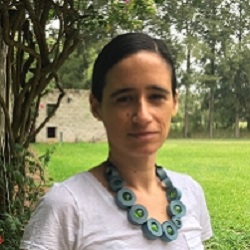Political Theory Colloquium: Labor, Nature, and Empire: Alienation and the (Post)Colonial Political Rift
Webcast Link

Please join the Political Theory Colloquium as we host , Professor Inés Valdez, Associate Professor in the Department of Political Science and the Director of the Latina/o Studies Program at Ohio State University. Professor Valdez will be available starting at 11:30 for those who wish to mingle in advance of the Zoom talk.
Professor Valdez will present a book chapter "Labor, Nature, and Empire: Alienation and the (Post)Colonial Political Rift." (Attached). Graduate student Usdin L. Martínez will provide a brief response before we discuss.
ABSTRACT
This chapter theorizes the politics of western expropriation of nonwestern human and nonhuman nature as a core component of imperial forms of rule. The chapter brings together Marx’s and Luxemburg’s accounts of capital’s voraciousness for natural resources and exploitable labor with an ecological reading of W. E. B. Du Bois’s writings on empire. I argue that racism maps onto a nature/technology divide which positions technologically advanced societies as uniquely able to rule and dictate the fates of non-white peoples and the land they occupy. This stance devalues and alienates these societies from nature and from the racialized subjects who labor the earth’s surface and its insides. The alienation that follows from this divide cannot be understood in the absence of ideologies of racial hierarchy, which confine non-white bodies to manual and strenuous labor in contact with nature. Du Bois’s reconstructs this picture and counters it by turning upside down the relationship between race and technology. Against the account of white Europeans as uniquely technologically advanced, Du Bois posits racism as a convenient way to secure raw material and labor at null or negligible costs to feed European industrial machinery. Further, Du Bois criticizes the technological mindset and the unsustainable speed of development imposed by colonial and neo-colonial linkages, which prevents poor countries from pursuing “normal development” oriented to satisfy societal needs. This outcome represents a political rift that maps into the ecological rift created by global capitalism.
BIOGRAPHY
Professor Inés Valdez is a political theorist and an associate professor in the Department of Political Science at Ohio State University, where I also direct the Latina/o Studies Program. Her research is on critical race and feminist theory, migration, transnationalism, empire, and racial capitalism.
Her work in political theory of immigration explores how the use of big data by immigration enforcement brings about a new, mechanized notions of political authority that are less open to contentious politics and prone to circumvent constitutional protections. Past work on the political theory of migration looked at the construction of punishing lived experiences through enforcement regimes of surveillance, detention and deportation; the role of secularism in obscuring critical practices of contestation of domination; and the role of violence in underpinning and constituting law.